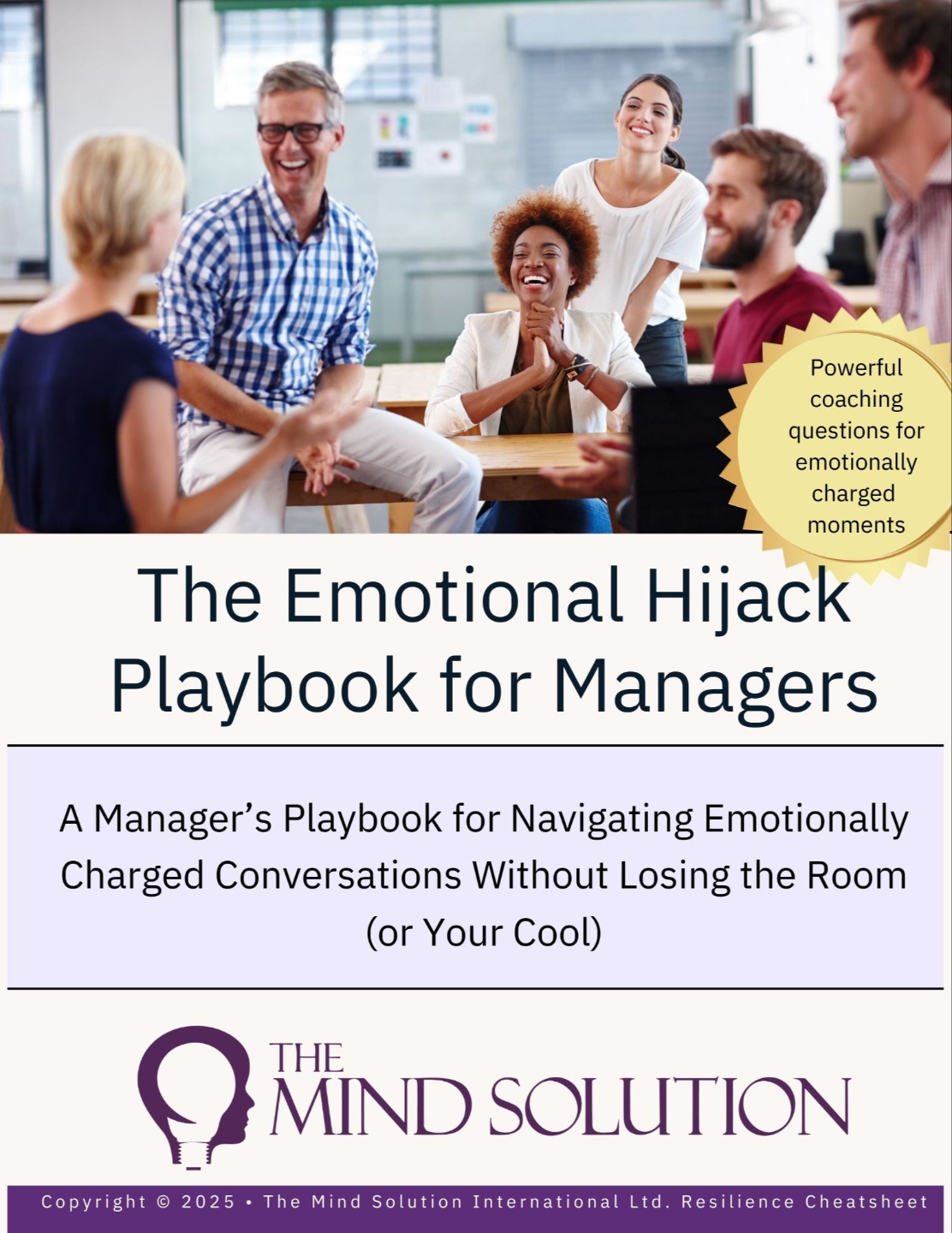Is Perfectionism Quietly Burning Out Your HR Team?
Nov 29, 2024
The Hidden Cost of Perfectionism in HR Leadership
Perfectionism might appear as high standards, but in HR, it’s often a silent saboteur. Learn how it fuels burnout and what emotionally intelligent leadership requires.
Perfectionism: The Silent Saboteur in HR
I've lost count of the number of HR professionals who’ve confided in me, sometimes laughing it off, “Oh, I’m just a bit of a perfectionist.”
But it’s not funny.
Because beneath that offhand comment is a deeper pattern, one that contributes directly to HR burnout. And I say this with a huge amount of empathy, because I used to be one of them.
Why This Matters in HR Leadership
In my emotional intelligence training for HR teams, one of the most eye-opening conversations we have is about perfectionism. Most people think it’s just about high standards. But it’s so much more than that.
Perfectionism in HR doesn’t just slow you down. It:
-
Undermines productivity
-
Sabotages delegation
-
Fuels anxiety
-
And drains your leadership capacity
When I worked in HR, I wore my high standards like a badge of honour. But behind the scenes? I was overworking, overthinking, and constantly second-guessing myself.
And I see that same pattern play out in HR teams across the globe, people who are brilliant, capable, and drowning in self-imposed pressure.
What’s Really Driving Perfectionism?
Perfectionism is rarely about excellence. It’s about proving yourself. And in many cases, it’s driven by early experiences:
-
A parent who set impossibly high standards
-
A need to earn love through achievement
-
A fear that you’re not enough, unless everything is flawless
It becomes a coping mechanism.
It becomes your identity.
When I deliver HR leadership development programmes, we go beyond the surface. We don’t just talk about “coping with stress.” We explore what’s creating the pressure in the first place, and perfectionism is often right at the heart of it.
Perfectionism and the Productivity Trap
Let’s talk about productivity. Because perfectionism is sneaky, it makes you feel like you’re getting a lot done. But what it’s really doing is slowing you down.
How?
Because perfectionism makes you:
-
Rewrite the email five times
-
Delay the presentation until it’s “just right”
-
Avoid delegating because “no one else will do it to my standard”
-
Spend hours trying to fix a problem that isn’t really yours to solve
I’ve had countless coaching conversations where leaders admit, “It’s just easier if I do it myself.” But when we dig deeper, we uncover a trust issue. Not with others, but with themselves. They don't trust that they're allowed to let go.
And here’s the truth: If you’re in HR and you can’t delegate, you will burn out. Period.
Real Talk: The CEO Who Couldn’t Let Go
A few years ago, I delivered mental health training for managers at a PR organisation in New York. During the session, the CEO spoke openly about her perfectionist streak. She admitted that it often led to micromanaging. She struggled to trust others with tasks, even though she was now leading the entire company.
That level of honesty was rare and powerful.
She realised that her inability to let go wasn’t about control. It was about fear. Fear that if something went wrong, it would reflect badly on her. That fear was exhausting her. And it’s a pattern I see regularly in HR teams, especially with those holding senior leadership roles.
The Link Between Perfectionism and HR Burnout
HR burnout doesn’t always come from workload.
It often comes from how we hold the workload.
If you’re an HR leader and:
-
You feel constantly behind
-
You find it hard to switch off
-
You’re triple-checking everything you do
-
You feel emotionally wiped at the end of the day
…you might not be “just tired.” You might be living under the weight of perfectionism.
You may not even see it as a problem. You’ve probably been praised for your work ethic (I used to think I was amazing being at my desk at 7 am when I was aged 24!), your attention to detail, and your high standards. But the very thing that got you here may now be the thing holding you back.
How Perfectionism Blocks Delegation
Delegation is a critical leadership skill. But perfectionism kills it.
Because if you don’t trust anyone else to do it “right,”
You’ll keep everything on your own plate.
And then you’ll wonder why you feel so overwhelmed.
The result?
-
You limit your team’s growth
-
You overextend yourself
-
You create a culture of dependency instead of empowerment
Leadership is not about doing it all yourself. It’s about creating the space for others to rise. And perfectionism suffocates that space.
From HR Perfectionist to HR Alchemist
When I left HR and trained as a therapist, I had what I can only describe as a breakdown-breakthrough moment.
I walked into a five-day EFT Training Programme thinking I was there to learn tools for my clients. I didn’t think I had anything to work on personally.
On day one, people were sharing their deepest traumas. And there I was, confidently saying, “I’m just here to learn, I don't have anything going on with me.”
By day three, I was sobbing.
I realised my perfectionism had nothing to do with standards, and everything to do with a belief I needed to be seen as perfect.
It changed the way I saw everything.
Fast forward over a decade, and it's one of the reasons why I created HR Alchemy, an emotional intelligence programme for HR teams.
Because I don’t want other HR leaders to have to hit burnout before they realise there’s another way.
HR Alchemy: A New Way to Lead
HR Alchemy is my signature emotional intelligence training for HR teams. It’s designed to help you:
-
Understand your internal drivers (like perfectionism)
-
Build emotional intelligence from the inside out
-
Create psychologically safe HR environments
-
Shift from control and exhaustion to presence and power
It’s not another leadership theory session. It’s a rewiring of the way you relate to yourself—because your internal world is what shapes your leadership.
We teach HR leaders and teams how to recognise emotional patterns like overthinking, proving, people-pleasing, and perfectionism, and how to break the cycle.
Because when you free your team from the inside,
You transform your whole organisation.
Ready to Change the Way HR Leads?
Perfectionism isn’t a personality trait, it’s a pattern.
And patterns can be changed.
Your team doesn’t need more theory.
They need the tools to understand what’s really going on beneath the surface—and the skills to rise beyond it.
Let’s bring emotional intelligence to your HR team in a way that changes how they lead, how they feel, and how they show up.
👉 Schedule an HR Alchemy Discovery Session and let’s unhook your team from burnout—for good.
The Emotional Hijack Playbook For Managers
A Manager’s Free Resource for Navigating Emotionally Charged Conversations Without Losing the Room (or Your Cool).
Perfect to use in your next one-to-one.







